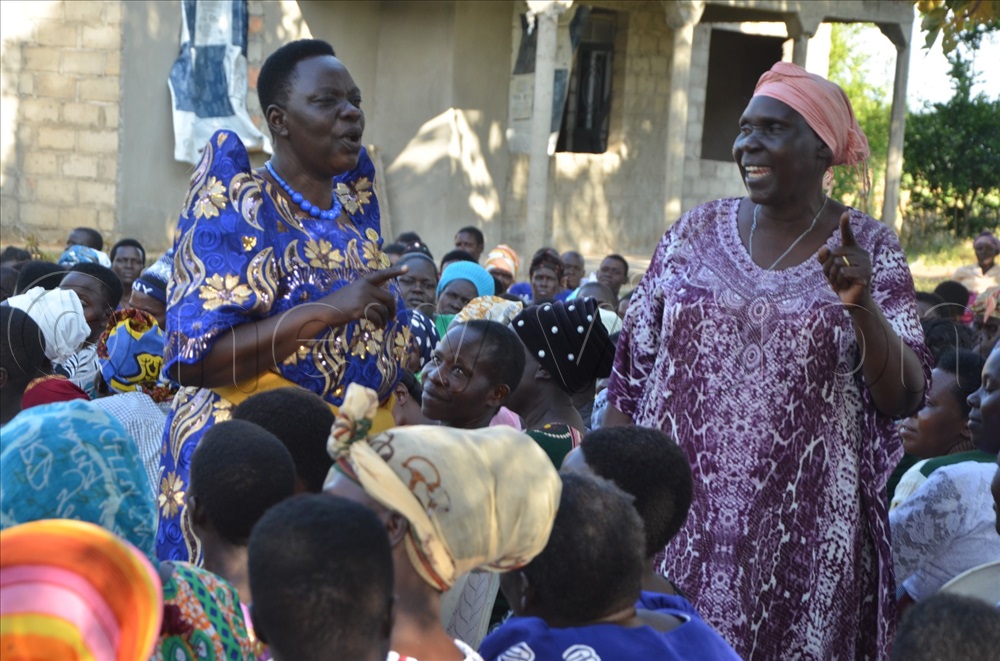'They only bring us more pain': Teso widows cry out against land grabbers
“Widows are in pain. I am unable to provide for my six children. The Government must enforce the law to protect us,” Acen stated.
Lilian Omurangi, an attorney with Redeem International’s Soroti Office speaking to Teso widows during their conference at St. Paul Anglican church in Katakwi District on Wednesday. (Photo by Delux Emmy Alomu)
________________
Widows in the Teso sub-region are urging the government to intensify efforts in raising awareness to combat the growing issue of land grabbing that directly affects them.
Many of these women report losing significant portions of their land due to intimidation and threats from individuals taking advantage of their vulnerable situation, leaving them feeling unsafe and neglected in their communities.
The widows are appealing for the Government and development partners to enhance initiatives aimed at educating the public about the damaging effects of land grabbing, and to ensure widows secure their rightful shares of land and property.
Joyce Mary Angwedo, a resident of Opuyo ward in Soroti city, recounted how her brother-in-law allegedly seized her land and vehicle in 2016 following the death of her husband, Moses Ongwara, in 2002.
“I am now struggling to care for my four orphans. I urge the Government to take action against these criminals and impose strict penalties, as their actions only bring us more pain,” Angwedo expressed.
Janet Ojamo Apule, a 57-year-old widow from Aleles-Magoro cell in Katakwi town council, shared her distressing experience in which her brother-in-law claimed ownership of her two acres of land after her husband’s death in 2012.
“He threatened me, saying that since I have no children, I should return to my village in Usuk with nothing but a name. Fearing for my safety, I had to go back to my father’s house,” she explained.
Apule called on the Government and development partners to educate communities about the consequences of land grabbing from widows.
“The Government needs to step in so that widows receive what is rightfully ours. We deserve to inherit what our husbands left for us,” she insisted.
Esther Acen, 48, from Wera subcounty in Amuria district, described her struggles after her co-wife’s son claimed ownership of land purchased by her late husband in 2012.
“Widows are in pain. I am unable to provide for my six children. The Government must enforce the law to protect us,” Acen stated.

Elizabeth Ebasu, the Mothers Union president in the Anglican Diocese of Soroti (left) speaking to women during the conference in Katakwi district on Wednesday.
Grace Anapo, a 75-year-old widow from Oalei village in Aliakamer parish, Katakwi district, narrated how her clan met after her husband William Ojakol passed away.
She felt compelled to give up three plots of land to her affluent grandchildren, who had taken their dispute to the clan.
“I’m now enduring hardship with my eight children and 30 grandchildren who all need assistance,” Anapo said.
These challenges were highlighted during the Soroti Anglican Diocese’s annual women’s conference, which drew more than 1,500 women, including widows from across Teso.
The conference, held from August 25-28, 2025, at St Paul’s Church of Uganda in Usuk Archdeaconry, Katakwi district, focused on the theme “Imitating God’s Goodness by Doing Good,” inspired by Galatians 6:9-10.
Elizabeth Ebasu, Mothers’ Union president in the Anglican Diocese of Soroti, expressed deep concern for widows who have endured prolonged suffering, to the extent that some struggle to forgive those who seize their land and property.
Ebasu called on the government to act in support of widows by fostering a culture of respect for women and their rights to property after their husbands’ deaths.
She reminded land grabbers of a biblical warning: anyone who harms or disappoints a widow risk having their own children face similar fates of loss.
Redeem International, in collaboration with the police, was invited by the Anglican Church to raise awareness about the rights and responsibilities of widows.
SP John Robert Tukei, the East Kyoga Police regional community liaison officer, attributed the rise in land disputes involving widows and orphans to the greed of local leaders, particularly clan heads and family leaders.
Tukei noted that some clan leaders accept bribes to rule in favour of wealthy land grabbers, leaving widows and orphans without any recourse.
Despite Redeem International’s valuable support to police in community sensitisation, Tukei questioned why cases of land grabbing against widows and orphans continue to escalate in the region.
Lilian Omurangi, an attorney with Redeem International’s Soroti office, reported that since April 2024, the organisation has recorded more than 30 cases of land grabs targeting widows in Kaberamaido, Kalaki, Amuria, Soroti, and Soroti city.
She revealed that Kalaki district has unfortunately taken the lead in such cases, with relatives often violently confronting widows and blaming them for their spouse’s deaths
Omurangi described a grim reality in which widows have been stripped of property, while many children have been taken from them by brothers or fathers-in-law, leaving them without support.
She cautioned that those who interfere with estates could face imprisonment for up to ten years, while those guilty of criminal trespass may serve two years or more.
Importantly, she reminded widows of their rights to inherit property, manage their deceased husbands’ estates, and pursue succession, as well as their parental responsibilities towards their children.
She also encouraged them to draft wills and obtain letters of administration to ensure access to benefits, especially in cases where husbands died without wills.
Redeem International is a non-governmental organisation that assists local law enforcement authorities in protecting widows and orphans from land grabbing.